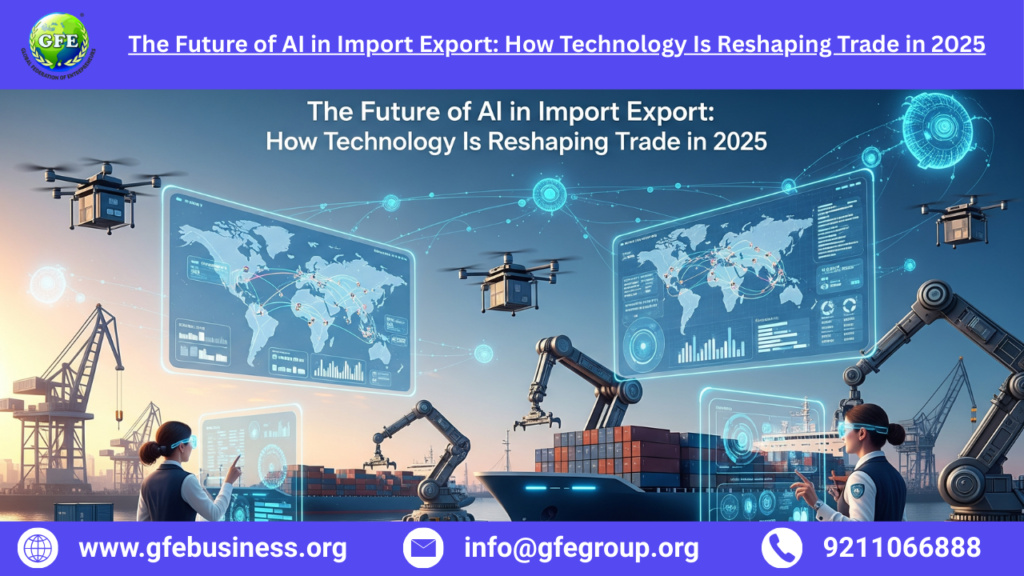
The Future of AI in Import Export: How Technology Is Reshaping Trade in 2025
Artificial Intelligence (AI) is no longer just a buzzword—it is fundamentally changing how businesses operate worldwide. In the import-export industry, AI is driving efficiency, reducing risks, and helping companies adapt to rapidly shifting global trade policies. According to a report by PwC, AI could contribute up to $15.7 trillion to the global economy by 2030, and international trade will be one of the biggest beneficiaries.
For entrepreneurs and businesses looking to start or grow their trade journey, understanding the role of AI in import export is no longer optional—it’s essential. At GFE Business, which has served over 25,000 clients across 35+ countries, we’ve seen first-hand how startups and established businesses leverage technology to stay competitive.
Why AI Matters in Import Export
AI provides solutions to some of the most pressing challenges in international trade:
Regulatory Compliance: AI helps businesses keep up with frequent changes in trade laws.
Supply Chain Management: Predicts demand and ensures timely shipments.
Risk Mitigation: Analyzes data to flag fraud, customs risks, or financial issues.
Cost Reduction: Automation lowers manual work and improves accuracy.
This combination allows businesses to grow faster while cutting down on errors and unnecessary expenses.
Key Applications of AI in Import Export
1. Predictive Analytics for Market Trends
AI tools can analyze trade data, competitor strategies, and consumer behavior to forecast which products will be in demand in 2025. For example, exporters can identify rising markets for pharmaceuticals and electronics—two sectors where India is already booming.
2. Smart Supply Chain and Logistics
AI-powered systems optimize shipping routes, reduce fuel costs, and predict delivery delays. Companies like Maersk and DHL are already using AI to streamline global logistics, showing the future for Indian exporters.
3. Customs Clearance and Documentation
Paperwork is one of the biggest pain points in trade. AI tools now automate invoices, customs declarations, and compliance checks, reducing clearance times and helping startups avoid costly penalties.
4. Fraud Detection and Trade Security
AI systems monitor unusual financial activities, preventing fraud and ensuring safer international transactions—a key concern for startups entering new markets.
5. AI-Powered Virtual Assistants
Import-export entrepreneurs can use AI chatbots to handle inquiries, guide clients through orders, and provide instant updates on shipments, improving customer experience.
Benefits of AI in Import Export for Startups
For new entrepreneurs in 2025, AI is not just about efficiency—it’s about competitiveness. Some major advantages include:
Reduced Entry Barriers: AI tools provide startups with real-time trade insights without needing big teams.
Global Reach: Predictive systems help identify profitable countries to target.
Faster Growth: AI-driven automation frees entrepreneurs to focus on scaling.
Cost-Effectiveness: AI reduces operational costs—critical for startups with limited budgets.
By integrating AI into their business, startups can match the speed and professionalism of large trading companies.
The Indian Context: AI Driving Export Growth
India’s government initiatives like the Digital India mission and National AI Strategy are accelerating AI adoption in trade. Combined with India’s booming pharma, textiles, and electronics exports, AI gives entrepreneurs the tools to thrive in global markets.
At GFE Business, we help businesses integrate modern trade strategies, from compliance to market research, ensuring they stay ahead in the AI-driven economy.
Explore More from GFE Business Blogs
To better understand how global trade is evolving, check out these insights from our blog section:
U.S. Trade Enforcement Surge and What It Means for Indian Exporters
China Streamlines Gold Imports: Opportunity for Indian Jewel Exporters?
Global Supply Chain Diversification in 2025: What Import-Export Businesses Must Know
Conclusion
The future of AI in import export is not a distant dream—it is happening now. From predictive analytics to smarter supply chains, AI is transforming trade in ways that empower both startups and established exporters. Entrepreneurs who embrace these technologies in 2025 will not only survive but thrive in the global marketplace.
If you’re looking to start or scale your international trade journey, GFE Business provides the right expertise, ISO-certified processes, and proven strategies to help you succeed.
FAQs on AI in Import Export
1. How is AI changing the import-export business in 2025?
AI improves efficiency, reduces costs, and enhances compliance by automating logistics, customs, and trade forecasting.
2. Can small startups use AI in import export?
Yes, AI tools are now affordable and scalable, making them ideal for small businesses entering global trade.
3. Which areas of import-export benefit most from AI?
Supply chain optimization, customs clearance, risk management, and fraud detection are top areas where AI adds value.
4. Is AI mandatory for future success in global trade?
While not mandatory, businesses that adopt AI gain a competitive edge, especially in efficiency and global reach.
5. How can GFE Business help with AI in trade?
GFE Business offers tailored support, compliance guidance, and strategies to integrate AI-driven processes into import-export businesses.